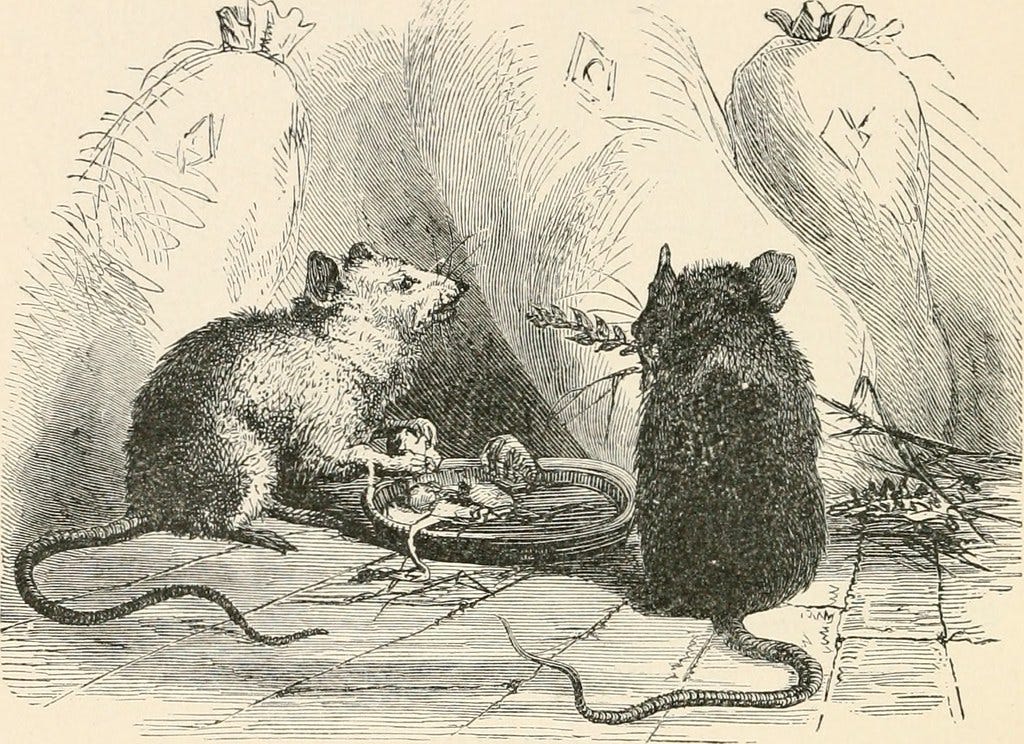What is in a name?
Hounds, rats, scorpions, cats and coyotes

My grandfather, a working class man who taught special ed in Compton, once told me that the most valuable thing I’d ever own was my good name. He said that it takes a lifetime of investment to build it but that I could destroy it in a single careless moment. For my grandfather this was more about social integrity and a nod towards his Jewish faith than it was an admonition to guard my credit score. In the Jewish tradition names carry great significance. It is an honor to name someone after a loved one or a respected elder who has passed so that their name lives on. Similarly one of the more extreme Jewish curses is Yimakh shemo which generally means "may your name be erased and memory forgotten."
At the time my grandfather shared this wisdom with me I wasn’t really in a place to understand it fully (as is often the case when we are presented with wisdom from our elders) but as my career has matured the rightness of it has become abundantly clear.
I’ve been thinking about trust lately and how much the relatively small tech ecosystem relies on the integrity of its participants. LPs trust VCs to execute their strategy faithfully, to work hard and to be appropriately diligent. VCs trust founders to execute the business plan they’re pitching, to spend the money wisely and to sacrifice a great deal in the quest for success. Founders must trust VCs to follow-through on the promises made during the fundraising process and to do no harm post-investment.
While many of these things can be covered by form legal documents the truth of the matter is that contracts do little more than establish expectations. When push comes to shove litigation is too expensive in terms of reputation, time and money to be a viable option in 99.9% of cases. In a world where contracts are barely enforceable but people need to make significant decade long commitments to one another, being trustworthy is essential. Your good name is EVERYTHING.
As I think more about what it means to have a good name, to trust and to be trustworthy, I’ve started to segment the types of trust and the actors in the ecosystem. This is a very early framework for me but I think trust falls into several buckets, each of which I’ve assigned to a spirit animal. Roughly in descending order from most to least trustworthy: the hound, the rat, the scorpion, the feral cat and the coyote.
THE HOUND

Hound: The loyal hound is the archetype of perfect intrinsic trust. This is the person who you know by reputation and personal experience can be relied upon through thick and thin. Embodying these values is what my grandfather was getting at those long decades ago. The interesting thing about the hound is that it is largely binary. You can either be trusted by everyone in all circumstances or you can’t. Once you have lost perfect trust with someone it takes years of effort to earn it back.
THE RAT

Rat: While the rat is traditionally thought of in a pejorative sense, that is not how I am using it here. The rat is a fairly smart critter but one of simple motivations and pleasures, the cheese at the end of the maze. Rats are actually quite trustworthy but the trust comes not from intrinsic motivations, rather it comes as a function of an extrinsic motivator. As long as you know the rat’s cheese and can place it in a way that aligns all of your interests, the rat makes for a good partner on the road, just don’t get between it and the cheese.
THE SCORPION

Scorpion: This archetype comes from one of my favorite fables (The Scorpion and the Tortoise). The Scorpion is intrinsically motivated, like the hound, but the motivations don’t trend towards altruism or honesty. This is the prototypical bad or amoral actor. I place it in the middle of the trustworthy pack though because while the Scorpion may be hard to work with, their lack of trustworthiness is itself dependable. You can game plan around their natures (caveat emptor).
THE CAT

Feral Cats: The cat archetype is the actor who largely works alongside you in a trustworthy way but has an irrational streak and so while in a very real sense they may be trustworthy, they are not dependable.
THE COYOTE

Coyote: Every culture has a coyote, fox or wolf archetype. These are the clever tricksters and the rogues of legend. Coyotes tend to be extrinsically motivated, like rats but they are playing 4D chess which makes understanding their true motivations extremely difficult. When you engage with a coyote you never know if you are the partner or the mark.
Individuals are complex and obviously embody elements of all of these archetypes in differing and shifting quantities depending on the context and the relationship. For example a friend may play the hound in your dealings with them but the rat in most business contexts. Who are you? Who do you try to surround yourself with? How do you want the folks you work with to think about you? What is your name worth? What do you think I am missing in this framework?
For me, I want to be the hound AND to be seen as the hound, I think it most closely aligns with my personal values and I think I’m lucky enough to be in an industry where playing the hound is long term greedy.
Woof,
Jake
Don’t forget, we’re running a new Q&A series. Whether you’re a founder trying to decode VC email etiquette, an aspiring VC or LP getting into the nuts and bolts of portfolio construction, or a startup employee having a crisis of faith, we’re here for you. Send us your questions with this Q&A form and we’ll answer it in a future edition of Ask The Venture Folks.

